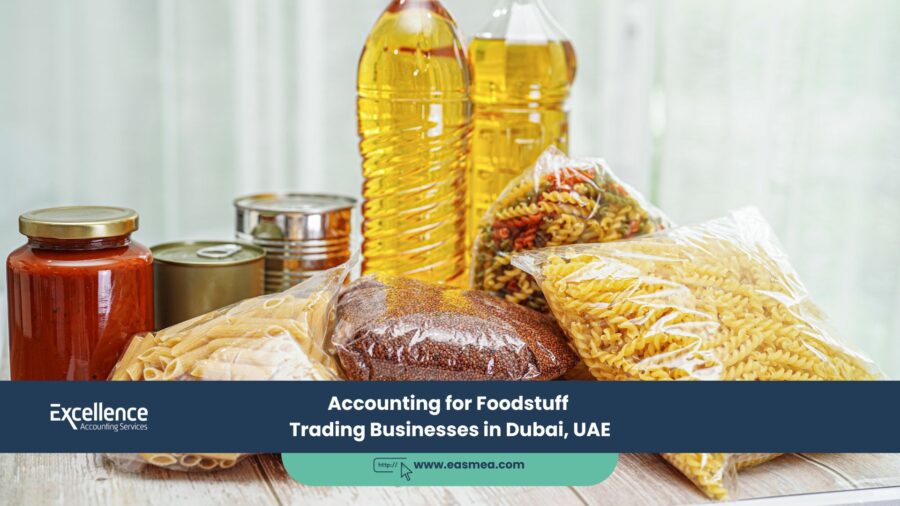Dubai’s strategic position as a global logistics hub makes it a vital center for the import, export, and distribution of foodstuffs, feeding its diverse population and serving the wider region. Foodstuff trading companies are the essential link in this complex supply chain, sourcing products globally and ensuring they reach supermarkets, restaurants, and hotels. While the demand for food is constant, the business of trading it is a high-volume, low-margin industry where profitability is perishable and financial control is paramount.
Accounting for a foodstuff trading business in Dubai is a uniquely challenging discipline. It requires the meticulous management of perishable inventory with a limited shelf life, strict adherence to import and food safety regulations, and a deep understanding of the specific VAT rules that apply to food items. Without a robust accounting framework, profits can quickly spoil due to waste, logistical inefficiencies, and compliance failures.
This definitive guide provides a strategic blueprint for Accounting for Foodstuff Trading Businesses in Dubai, UAE. We will explore the critical financial practices for the food sector, from the complexities of inventory valuation and managing spoilage to navigating the regulations of Dubai Municipality and the Federal Tax Authority. We will provide the clarity you need to build a compliant, efficient, and highly profitable trading operation.
Whether you trade in fresh produce, frozen goods, or packaged consumer foods, this guide will equip you with the financial knowledge to manage your business with precision. We will cover industry best practices, essential financial controls, and the reporting that builds trust with suppliers, customers, and regulatory bodies.
Key Takeaways
- Perishable Inventory is the Core Challenge: The primary accounting and operational challenge is managing inventory with a limited shelf life. This requires a strict First-In, First-Out (FIFO) system and accounting for spoilage as a direct cost.
- Landed Cost Calculation is Crucial: The true cost of your food items must include the purchase price plus all import costs like shipping, customs, insurance, and any special handling (e.g., refrigerated transport).
- Regulatory Compliance Drives Costs: Adherence to food safety and import regulations from authorities like the Dubai Municipality is mandatory and involves costs for testing, certification, and labeling.
- VAT on Food is Nuanced: While many basic food items are zero-rated for VAT, others are subject to the standard 5% rate. Correctly classifying and applying VAT is essential for compliance.
- Gross Margin Management is Key: In a low-margin business, meticulously tracking your gross profit on every product line is the only way to ensure sustainable profitability.
The Financial Anatomy of a Foodstuff Trading Business
A foodstuff trading company is a specialized distributor operating in a fast-paced, high-stakes environment. The business model is built on volume, logistics, and speed. Success depends on sourcing quality products at competitive prices, maintaining an efficient cold chain and supply line, and managing the significant financial risks associated with perishable goods.
Operating in Dubai means all food imports are subject to the stringent rules and inspection processes of the Food Safety Department of the Dubai Municipality. Their regulations on labeling, shelf life, and traceability are non-negotiable and form a critical part of your operational and cost framework.
The Core of Accounting for Foodstuff Trading Businesses in Dubai, UAE
The fundamental principle of accounting for foodstuff trading businesses in Dubai, UAE, is the rigorous control and valuation of perishable inventory. Your biggest asset is also your biggest risk. A failure to manage stock rotation and account for potential spoilage can wipe out your profits entirely. Your accounting system must provide real-time visibility into your stock levels, expiry dates, and costs.
The Perishable Inventory Challenge
Unlike traders of electronics or textiles, your inventory has a ticking clock. This makes the First-In, First-Out (FIFO) method of inventory accounting not just a choice, but an operational necessity. You must physically sell your oldest stock first to minimize spoilage. Your accounting system must mirror this reality. When you calculate your Cost of Goods Sold (COGS), it should be based on the cost of the first goods you purchased.
In food trading, inventory is not just an asset; it’s a liability in waiting. Every day that passes is a day closer to a potential write-off.
Spoilage is an unavoidable cost of doing business and must be accounted for correctly. When goods expire or become unsaleable, they must be “written off.” This involves an accounting entry to remove their cost from your “Inventory” asset account and record it as an expense on your income statement, often in a specific account like “Spoilage and Waste.” Tracking this expense as a percentage of sales is a critical KPI for your procurement and warehouse teams.
A Closer Look at Accounting for Foodstuff Trading Businesses in Dubai, UAE
Profitability in this low-margin sector is found in the details. Accurately calculating the full cost of your products and managing the complexities of a global supply chain are essential. A professional bookkeeping service with experience in the FMCG or trading sector can be invaluable.
Calculating the “Landed Cost” of Food Items
The true cost of your inventory is not just the price you paid the farmer or manufacturer. It’s the “landed cost”—the total cost to get the product from the source to your warehouse in Dubai. A failure to capture all these associated costs will lead to an understated COGS and an overstated profit. The landed cost includes:
| Landed Cost Component | Examples | Importance for Food Trading |
|---|---|---|
| Purchase Price (FOB) | The price paid to the supplier. | The base cost of the inventory. |
| International Freight | Sea freight (for frozen/packaged) or air freight (for fresh/perishable). | Air freight is much more expensive and must be factored into pricing. |
| Special Handling | Refrigerated “reefer” container charges, cold storage at the port. | Essential for maintaining the cold chain and product quality. |
| Customs & Clearance | Import duties (if any), customs fees, food testing fees, documentation charges. | A mandatory cost for every shipment. |
Your accounting system must be able to allocate all these costs to the specific shipment they relate to. This gives you the true landed cost per kilogram or per unit, which is the correct basis for valuing your inventory and calculating your gross profit upon sale.
Navigating VAT and Tax for the Food Industry
The UAE has specific tax rules for the food sector, particularly concerning VAT. A clear understanding of these regulations is essential for compliance and for maintaining your competitive pricing. For the most authoritative guidance, you should always consult the official website of the Federal Tax Authority (FTA).
VAT on Foodstuffs: Zero-Rated vs. Standard-Rated
The application of VAT to food items in the UAE is nuanced. While many food items are zero-rated, not all are. The FTA provides a detailed list, but the general principles are:
- Zero-Rated (0% VAT): This applies to most basic food items intended for human consumption, such as fruits, vegetables, bread, meat, and dairy products. You do not charge VAT on the sale of these items, but you can still reclaim the input VAT you paid on your business expenses.
- Standard-Rated (5% VAT): This applies to certain categories of food and beverages. A key category is “confectionery, and sweetened or carbonated beverages.” This means items like chocolate, sweets, and soft drinks are subject to 5% VAT. Some other processed foods may also fall under the standard rate.
It is absolutely critical that you correctly classify every single product you sell. Applying the wrong VAT rate can lead to significant penalties. A meticulous accounting setup is required to handle these different VAT treatments. For expert help, our specialized VAT services can provide crucial support.
Corporate Tax for Foodstuff Traders
Your foodstuff trading company will be subject to the 9% UAE Corporate Tax on its annual taxable profits exceeding AED 375,000. Your taxable profit is your gross profit (Sales minus COGS) less your operating expenses. The accuracy of your landed cost calculation, inventory valuation, and accounting for spoilage will have a direct and significant impact on your taxable profit. Maintaining complete and organized records for every transaction is mandatory. Professional corporate tax services are vital for ensuring you meet these complex requirements correctly.
What Excellence Accounting Services Can Offer
At Excellence Accounting Services (EAS), we have extensive experience in the import, distribution, and trading sectors. We understand the unique financial challenges of the foodstuff industry, from the pressures of perishable inventory to the complexities of international logistics and specific VAT rules. We offer specialized accounting services to help you build a profitable and compliant operation.
Our specialized offerings for foodstuff trading companies include:
- Perishable Inventory Accounting: We help you implement robust systems to track your stock, manage FIFO principles, and correctly account for spoilage and write-offs.
- Landed Cost Calculation: We ensure all import and logistics costs are accurately captured and allocated, giving you a true picture of your product costs and gross margins.
- VAT Compliance for Food Items: Our tax experts specialize in the nuanced VAT rules for the food sector, ensuring you correctly classify your products and manage your VAT filings.
- Multi-Currency and Trade Finance Advisory: We can help you manage transactions in multiple currencies and provide guidance on using financial instruments for international trade.
- Virtual CFO Services: Get high-level strategic guidance on pricing, margin analysis, and cash flow management. For more details, see our Virtual CFO services.
By partnering with EAS, you gain a financial team that understands the fast-paced nature of your industry. We handle the financial complexity so you can focus on sourcing and delivering quality food products.
Frequently Asked Questions (FAQs)
Expired inventory must be “written off.” This is an accounting entry that removes the cost of the expired goods from your “Inventory” asset account on the balance sheet. This cost is then recognized as an expense on your income statement, typically in an account called “Inventory Spoilage & Write-offs.” This ensures your assets are not overstated and your profitability reflects the real cost of doing business.
When you make an advance payment to a supplier, you have not yet received the goods. Therefore, you cannot record it as inventory or an expense. This payment should be recorded on your balance sheet as a current asset, in an account like “Supplier Advances” or “Prepayments.” When you receive the goods and the final invoice, you would then record the full value of the goods as inventory, reduce the “Supplier Advances” asset to zero, and record the remaining amount due as an “Accounts Payable.”
FIFO (First-In, First-Out) assumes the first items you purchased are the first ones you sell. Your COGS is based on the cost of your oldest inventory. This is the most logical method for perishable goods. Weighted Average Cost calculates a new average cost for all units in stock after every purchase. Your COGS is based on this constantly updated average. While simpler for non-perishable goods, it is less appropriate for the food industry where tracking batches and expiry dates is crucial.
Yes. Any mandatory fees paid to government bodies like Dubai Municipality for services such as lab testing of food samples, health certificates, and import permits are considered a necessary cost of doing business. As such, they are fully deductible as a business expense when calculating your taxable profit for UAE Corporate Tax purposes.
Your tax invoice must be very clear. It should list each item on a separate line. For the fresh vegetables, the VAT rate column should show 0%. For the canned soft drinks, the VAT rate column should show 5%, and the VAT amount should be calculated on that line item. The total invoice amount will be the sum of all items plus the 5% VAT charged only on the standard-rated items. Your accounting software must be able to handle this “mixed supply” invoicing correctly.
This is a major risk. The best mitigation is prevention: ensure your supplier’s documentation, product labeling, and certificates are fully compliant with UAE regulations before the shipment even leaves its port of origin. Having good insurance that covers rejection risk is also important. If a shipment is rejected and must be destroyed, the entire landed cost of that shipment becomes a loss. You would have to write off the inventory and record a significant expense. This highlights the importance of working with reliable suppliers and experienced clearing agents.
A credit note is a document you issue to a customer to reduce the amount they owe you on an invoice. You would use it in situations like a customer returning damaged goods, or if there was a shortage in the delivery, or if you agree to give them a post-sale discount for some reason. From an accounting perspective, a credit note reduces your revenue and your accounts receivable. It is the official way to correct or adjust a previously issued sales invoice.
This is a key business decision with major financial implications. Air freight is much faster, which is essential for highly perishable items like fresh berries or specialty greens. However, it is significantly more expensive, which means your landed cost will be higher, and you will need to charge a higher price. Sea freight, using refrigerated “reefer” containers, is much cheaper and suitable for items with a longer shelf life, like apples, onions, or frozen goods. Your choice depends entirely on the product, and your accounting system must be able to track these very different freight costs accurately.
This is a classic challenge. Dealing with large retailers often means accepting payment terms of 60, 90, or even 120 days. Since you have to pay your own suppliers much faster, this creates a large working capital gap. The solutions are financial. You need to have sufficient capital in the business to fund this gap. You can also use trade finance facilities like “invoice discounting” or “factoring,” where a bank or finance company will advance you up to 80% of your invoice value immediately, for a fee. This can be a lifeline for managing cash flow when dealing with large customers.
In a high-volume, low-margin business like food trading, Gross Profit Margin is your most important KPI. It is the profit you make from simply buying and selling the product (Revenue minus Cost of Goods Sold) before you even consider your overheads like salaries and rent. If your gross margin is too thin, you will never make enough profit to cover your overheads, no matter how much you sell. Tracking your margin by product category and by customer allows you to identify which products are worth selling and which customers are most profitable, enabling you to make strategic decisions to improve your overall profitability.
Conclusion: Cultivating a Healthy Bottom Line
The foodstuff trading business in Dubai is a vital and demanding industry that keeps the city fed. Success requires not only a keen sense of the market and logistical prowess but also an unwavering commitment to financial discipline. A robust and detailed accounting system is the essential cold chain for your company’s financial health, preserving your profits and preventing the spoilage of your bottom line.
By mastering the art of perishable inventory management, accurately calculating your landed costs, and navigating the complexities of the UAE’s food safety and tax regulations, you build a business that is both resilient and profitable. This financial clarity allows you to trade with confidence, manage your risks effectively, and grow your enterprise on a foundation of trust and integrity. In the business of feeding the nation, sound accounting is the key ingredient for sustainable success.
From Farm to Financials.
Let Excellence Accounting Services provide the specialized financial management and industry insight your business needs to succeed in the UAE's competitive market.




